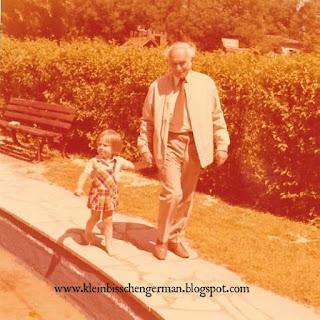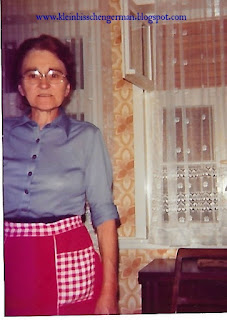Even though I was born in Germany and spent much of my childhood there while enjoying a typical American schooling and home life in the States as well, I never really thought of the amazing opportunity I had until just in the last few years ...
There are statistics out there about children who are raised bilingual. While there are a few issues for some children who have two parents speaking two different languages, it mostly seems to work itself out in their brains as they get older to separate the languages. The advantages usually outweigh the early issues. Children exposed to two languages at a young age, like me, usually have no accent in either language.
Bilingual children are NOT smarter, they just have some advantages ... but don't despair, so do adults who learn a second language as an adult!
From The Cognitive Benefits of Being Bilingual:
Despite certain linguistic limitations that have been observed in bilinguals (e.g., increased naming difficulty7), bilingualism has been associated with improved metalinguistic awareness (the ability to recognize language as a system that can be manipulated and explored), as well as with better memory, visual-spatial skills, and even creativity.29 Furthermore, beyond these cognitive and neurological advantages, there are also valuable social benefits that come from being bilingual, among them the ability to explore a culture through its native tongue or talk to someone with whom you might otherwise never be able to communicate.
In my experience, being bilingual hasn't made me much more creative ... nor do I seem to have a better memory (fading fast every year!!), but that last sentence struck a chord! I have had "the ability to explore a culture through its native tongue or talk to someone with whom you might otherwise never be able to communicate."
What a rich oral history I have stored up due to conversations with my German relatives, friends, and acquaintances - and even just American friends who have traveled in Europe. Granted, every grandparent, in my opinion, is a treasure trove of time past ... when life was very different than it is now; but to know and understand another history and culture entirely in real life not just from a text book is a great privilege.
How much I now treasure the fact that I know children's songs and nursery rhymes in both English and German ... have tasted so many diverse foods and learned to hold my cutlery in two different ways. It is those little differences, I think, that I appreciate now, and I revert right back to what my Oma and Opa taught me the minute my plane lands in Frankfurt. I gesture differently when I speak; I conduct myself differently when meeting a stranger; I count using my thumb to indicate the number 1 just as German children are taught to do. It is those funny little things that make me German ... some I learned because my mom and grandparents instilled them in me, some I mimic their behavior.
It is my bilingual-ness and the need to cherish and share those memories of my German side that inspired this blog. I am so grateful for the gift of knowing two languages and cultures ... it is also what makes me yearn always to return to my "home" in Germany.













































